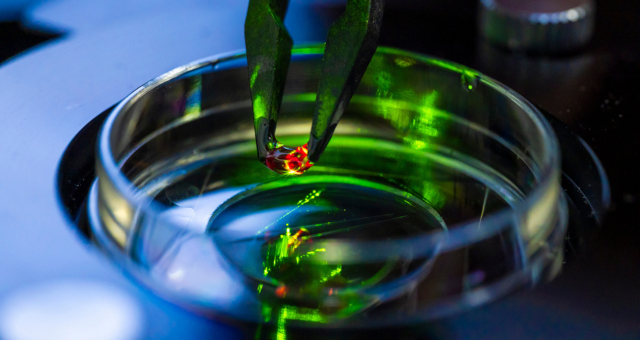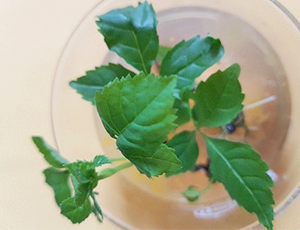search innovation

A multifunctional hydrogel material for the reconstruction of bone defects
keywords: injectable hydrogels, hydroxyapatite, alendronate, drug delivery system, biomineralization, osteoporosis, , bioactivity, hybrid materials, silica particles, biopolymers, collagen, chitosan, hyaluronic acid
offer number: P441, P490, P555
The degradation of the natural environment, the fast lifestyle often associated with an inadequate diet, and the progressive aging process of society are the cause of many diseases referred to as civilization diseases. One of them is osteoporosis, a disease of the skeletal system that causes a decrease in the density of bone tissue, which results in their weakening and the risk of fractures. Contemporary methods of treating osteoporosis are narrowed to vitamin D and calcium supplementation and the inclusion of drugs that slow bone resorption (e.g. sodium alendronate from the bisphosphonate group) or stimulate their regeneration. However, taking these substances intravenously or orally has many side effects, i.e. gastrointestinal discomfort, risk of nephrotoxicity, and flu-like symptoms. Therefore, new therapeutic methods are sought that would enable the local delivery of an active substance, thus reducing the systemic side effects of osteoporosis therapy.
Researchers from the Faculty of Chemistry, Jagiellonian University, have developed a multifunctional material for the purpose of the treatment of osteoporotic defects. The material offers minimal implantation invasiveness and controllable drug release process and features excellent biocompatibility as well as the regenerability of bone tissue. The hybrid material was obtained by suspending mesoporous silica-apatite particles with sodium alendronate anchored to their surface in a hydrogel biopolymer matrix (consisting of collagen/chitosan/lysine-modified hyaluronic acid or functionalized with amine groups of chondroitin sulfate). The developed material is injectable, which enables a low-invasive, controlled placing of the therapeutic substance in the bone defect.
The subject biomaterial is characterized by:
- simple and low-cost method of synthesis;
- high therapeutic potential while fewer systemic side effects (the presence of silica-apatite particles with an attached drug in the form of alendronate);
- injectability and gelling ability under physiological conditions facilitate its application;
- biointegration of the material with bone tissue facilitating bone mineralization process (polymer matrix enriched with mineral phase);
- biomatrix convenient for colonization with osteoblastic cells (biomimetic composition);
- favorable mechanical properties (polymer matrix enriched with mineral phase).
Application
In addition to the treatment and reconstruction of osteoporotic bone defects, the proposed material can be used to support the treatment of minor orthopedic and dental defects (e.g. jaw bone defects after tooth extraction).
The offered solution is a subject of a patent application. Further development of the invention is conducted by the scientific staff of the Faculty of Chemistry of the Jagiellonian University. Currently, the Centre for Technology Transfer CITTRU is looking for entities interested in licensing and application of the technology described above.


field of science: bioengineering, medical biology, chemistry, medicine, health sciences
forms of protection: patent, patent application
technological maturity: demanding R & D
property rights: Jagiellonian University
variants of cooperation: license, comercial contract research, sale
information / broker of Jagiellonian University

name and surname: Paula Janus
phone number: +48 12 664 42 16, +48 506 006 590
email: pa.janus@uj.edu.pl


























